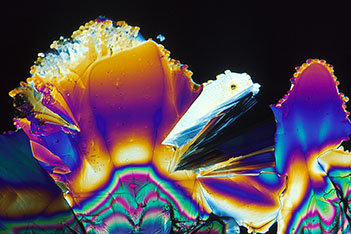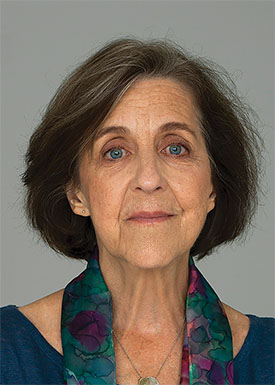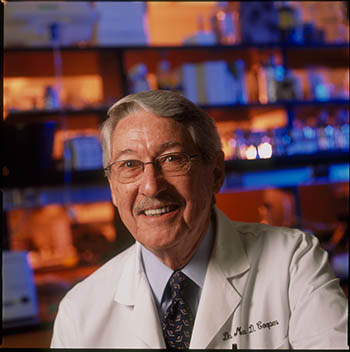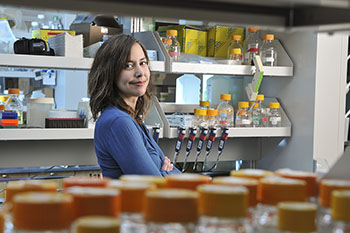Announcements
NIH RESEARCH FESTIVAL
- Wednesday, September 11, 8:55 a.m.-5:00 p.m.
- Note: At 8:46 a.m., there will be a moment of silence at 8:46 a.m., along with the rest of the nation, to remember the 9/11 attack 18 years ago
- Building 10
- September 12&13: Technical Sales Association Vendor Tent Show
- For more information and the agenda: https://researchfestival.nih.gov/2019

This year's Festival promises to be an extraordinary showcase of the diverse and innovative science conducted in the Intramural Research Program. The Festival co-chairs, John Gallin (CC/NIAID) and Amy Newman (NIDA), have opted this year to return the Research Festival to its original one-day concept in order to entice you to spend the whole day with them, to mingle with old colleagues, and to meet new ones.
As such, the Festival will feature three sets of plenary lectures, a blitz of micro-talks providing a snapshot of selected FARE awardees' work, and terrific poster presentations from some of our top junior scientists across the NIH. This will make the Festival a prime opportunity to learn from the very best, to see what's happening in your own backyard, to share novel ideas, and to chisel away at the Balkanization of science that can hinder the flow of ideas between scientific disciplines.
In addition to these presentations, the NIH Library will highlight its various services, including new virtual reality demos geared toward biomedical research. The Green Labs Fair will host vendors with products to help laboratories make the transition to more environmentally benign practices. And representatives from organizations such as the Office of Research Services and Center for Information Technology will staff tables to share information about the services they offer the NIH community.
And fun abounds. By popular demand, we will hold another bake-off /cook-off by the finest chefs among the Scientific Directors during the midday poster session. An army of food trucks will be parked outside of Building 10 to spice up lunchtime. We will have refreshments throughout the day. And a FARE awards ceremony at the end of the day open to all will feature light fare to celebrate, as well as music by the NIH Director's band, ARRA.
2019 NHLBI MARTHA VAUGHAN, M.D. SYMPOSIUM: REMEMBERING HER LEGACY
- September 9-10, 2019: 9:00 a.m. September 9 to 2:30 p.m. on September 10
- Lipsett Amphitheater (Building 10)
- For more information and to register: https://www.eventbrite.com/e/2019-nhlbi-martha-vaughan-md-symposium-remembering-her-legacy-tickets-64973007013
The National Heart, Lung and Blood Institute (NHLBI) invites you to attend the 2019 Martha Vaughan Symposium: Remembering Her Legacy. The event will bring together world experts on topics related to Dr. Vaughan’s areas of research interest and of the interests of her former postdoctoral fellows and other trainees. Dr. Vaughan also had a long-standing interest in mentoring and invitees will discuss how her mentoring affected their scientific and personal development.
The meeting will occur over two days on the NIH Bethesda campus and will include a dynamic range of invited speakers with clinical and scientific expertise
NCCIH AT 20: A CATALYST FOR INTEGRATIVE HEALTH RESEARCH
- Monday, September 23, 2019, 9:00 a.m.–4:30 p.m.
- Lipsett Amphitheater (Building 10)
- Register to attend in person or on videocast at https://www.eventbrite.com/e/nccih-at-20-a-catalyst-for-integrative-health-research-tickets-58142747523
- For more information, visit https://nccih.nih.gov/news/events/NCCIH-20
The National Center for Complementary and Integrative Health (NCCIH) will host a 1-day research symposium to celebrate the Center’s 20th anniversary. This event will celebrate progress in complementary and integrative health research and look to the future of the field. The symposium will feature the 2019 Stephen E. Straus Distinguished Lecture in the Science of Complementary Therapies, to be given by Lorimer Moseley, Ph.D., University of South Australia, on “Why We Need a Pain Revolution: From Science to Practice” (see https://nccih.nih.gov/news/events/NCCIH-20-Straus). Also included will be lightning-round presentations by invited early-stage investigators, and two panel discussions on pain research in military and veteran populations, and the future of natural products research. The symposium is partially supported by the Foundation for the National Institutes of Health with a generous gift from Bernard and Barbro Osher.
2019 HOWARD GADLIN LECTURE
- “To See Life Everywhere: The Urgency of Personal Stories in Medicine”
- Tuesday, September 24, 2019, 2:00-3:00 p.m.
- Masur Auditorium (Building 10)
- Videocast (NIH only): https://videocast.nih.gov/summary.asp?live=34473.

Medicine and bioscience are undergoing a revolutionary turn toward narrative ways of knowing. Patients yearn to tell their physicians and scientists what matters both in their bodies and in their lives. Clinicians write creatively about the suffering that they witness, growing in empathy and accuracy as they represent what they see. We can all become radical listeners of patients and colleagues, recognizing one another nonjudgmentally while navigating together the conflicts and uncertainties and gifts of our embodied lives.
The lecture will be presented by Rita Charon, M.D., Ph.D., a physician, literary scholar and the Founder and Executive Director of the Program in Narrative Medicine at Columbia University (New York). Her research focuses on the consequences of narrative medicine practice, reflective clinical practice and health-care team effectiveness. She was recently honored as the 2018 National Endowment of the Humanities Jefferson Lecturer.
Individuals who need interpreting services and/or other reasonable accommodations, should contact Sarah Kith at sarah.kith@nih.gov or the NIH Interpreting Office directly (nih@ainterpreting.com). Requests should be made at least five days in advance of the event in order to ensure interpreter availability.
ARTIFICIAL INTELLIGENCE HEALTHCARE
FROM PREVENTION & DIAGNOSTICS TO TREATMENTS (AI-PDT)
- Tuesday, October 1, 2019, 9:00 a.m.–7:00 p.m.
- Ruth Kirschstein Auditorium (Natcher Conference Center, Building 45)
- Registration required: http://www.123formbuilder.com/form-5003877/workshop-registration-form
- Website for more information: https://datascience.nih.gov/news/artificial-intelligence-healthcare-oct-1-2019
- Videocast: https://videocast.nih.gov/summary.asp?live=34643&bhcp=1
The event will explore how we can cooperate to apply AI to enhance, and revolutionize, health care. The goals will include, but not be limited to, the following: 1) to strengthen and expand NIH’s innovation ecosystem by engaging a broad range of researchers, practitioners, and other professionals interested in artificial intelligence health care across the nation’s academic and industrial bases; 2) to inform stakeholders of NIH’s vision and priorities for AI, in the context of smart health care, to better enable collaboration and transition of technologies; 3) to inspire the technical research community to seek research and development partnerships with NIH by sharing NIH’s record of innovative achievements; 4) to establish an AI Healthcare Task Force with trans-NIH and trans-agency collaboration. The workshop is free and open to the public, and is designed for researchers, practitioners, and other professionals interested in ARTIFICIAL INTELLIGENCE HEALTHCARE. For questions, consult the website (see above) or contact June Lee at LeeJun@mail.nih.gov or 301-435-6987. This event is supported by the NIH Artificial Intelligence Interest Group, Office of Intramural Research, and NIH AI Working Group for Autonomous Therapeutics.
WALS RETURNS ON OCTOBER 2 WITH THE WILLIAM E. PAUL LECTURE
- Max Cooper, M.D., presents “Evolution of Adaptive Immunity in Vertebrates”
- Wednesday, October 2, 2019; 3:00-4:00 p.m.; reception follows
- Masur Auditorium (Building 10)
- Videocast: https://videocast.nih.gov
- The NIH Director’s Wednesday Afternoon Lecture Series (WALS) kicks off its 2019-2020 season by hosting the annual William E. Paul Lecture on Wednesday, October 2, in Masur Auditorium (Building 10).

Max Cooper
The lecture will be presented by Max Cooper, M.D., a professor of pathology and laboratory medicine at Emory University School of Medicine and a Georgia Research Alliance Eminent Scholar. His talk is titled “Evolution of Adaptive Immunity in Vertebrates.”
Cooper’s laboratory is studying the evolution of adaptive immunity and exploring the use of lamprey monoclonal antibodies for diagnosis and therapy of infectious diseases and lymphoid malignancies in humans. In the 1960s, he worked with Robert Good (an American physician who is regarded as the founder of modern immunology) to establish the dual nature of the immune system. In addition, Cooper also helped discover antibody class switching by B cells; describe the lymphoid follicle-associated epithelial M cells in the intestine and their transcytotic function; and define the fetal liver and bone marrow origins of B cells and pre-B cells. He is a former president of the American Association of Immunologists and the Clinical Immunology Society and the Kunkel Society. He is also a member of the U.S. National Academy of Sciences, the Academy of Medicine, the American Academy of Arts and Sciences, and a foreign member of the French Academy of Sciences and the Royal Society of London. He has won many awards including the 2018 Japan Prize.
This annual WALS lecture was established in 2016 in honor of William E. Paul, the leader of the NIH immunology community. His career is without parallel in the field of immunology.
There will be a reception (sponsored by FAES) and an opportunity to talk with Max Cooper in the NIH Library following the lecture. For more information and reasonable accommodation, contact Jacqueline Roberts (call 301-694-6747 or email WALSoffice@od.nih.gov) at least five days before the lecture. The WALS season will continue with most lectures being held on Wednesdays at 3:00-4:00 p.m. Check the WALS website for details including location information (Masur Auditorium will be under renovation for part of the lecture season): https://oir.nih.gov/wals.
STETTEN LECTURE
Researcher to Discuss Engineering Novel Biosensors in Dewitt Stetten Jr. Lecture
- Scalable Platforms for Generating RNA Sensors and Controllers
- Wednesday, October 23, 2019, 3–4 p.m. ET
- Masur Auditorium (Building 10)
- Website: https://www.nigms.nih.gov/News/meetings/Pages/2019-Stetten-Lecture-Scalable-Platforms-for-Generating-RNA-Sensors-and-Controller.aspx
- Videocast: https://videocast.nih.gov/

Featured speaker Christina Dawn Smolke (a professor of research in bioengineering and chemical engineering at Stanford University) will discuss designing biomolecules that have applications in diagnostics, drug development, green chemistry, and more at the 2019 DeWitt Stetten Jr. Lecture. Her lab has created RNA molecules, or switches, that can detect the disease state of a cell and are being further advanced for targeted drug delivery. Smolke is developing high-throughput methods to obtain information about the biochemical activity of millions of RNA switches in a single experiment. These data are used for producing new computational methods to predict the function of RNA molecules based on their sequence and structure. Smolke is a professor of bioengineering and, by courtesy, chemical engineering at Stanford University. She is also a member of the Wu Tsai Neurosciences Institute.
NIGMS established the annual DeWitt Stetten Jr. Lecture series in 1982, in honor of the third director of the Institute, DeWitt Stetten, Jr., M.D., Ph.D. The lecture is open to all and will be followed by a reception in the NIH Library. People who require sign language interpretation or other reasonable accommodation to participate in this event should contact Jacqueline Roberts, at jacqueline.roberts@nih.gov (or 301‑594‑6747) 5 days before the lecture.
THE NIH–JAPAN SYMPOSIUM RETURNS
- October 28–29, 2019
- Lipsett Amphitheater (Building 10)
- For more information: https://meetings.ninds.nih.gov/meetings/nih_japan_jsps_symposium/
It’s our turn to host again! The NIH-Japan-JSPS Symposium will focus on inflammation. The Symposium was born of great tragedy, the 2011 Tōhoku earthquake and tsunami in Japan. The NIH scientific community was much involved in the response to this tragic event: We sent a delegation of scientists to monitor the radiation leak from the Fukushima Daiichi Nuclear Power Plant complex; we sent scientific supplies to laboratories affected by the earthquake; and we hosted Japanese scientists during their period of recovery.
We also established this symposium to alternate between Tōhoku and NIH Bethesda every 18 months. We have since been joined by the Japan Society for the Promotion of Science (JSPS). The Symposium celebrates mutually beneficial interactions and training activities. One goal is to promote the career development of young scientists.
Speakers are a mix of NIH scientists and Japan-based scientists. Anyone with any interest in inflammation—and, really, what disease doesn't have an inflammation component— will benefit from hearing these fine set of talks.. The organizing committee co-chairs are Shioko Kimura (NCI) and Reiko Toyama (NICHD).
NEW MANDATORY ONLINE ANTI-HARASSMENT TRAINING
- Deadline for new hires: Within 90 days of onboarding
- Annual deadline for others: November 15
The NIH is committed to achieving a harassment-free work environment. As part of this commitment, the agency launched a new online Anti-Harassment training in August. The goals of the training are to educate individuals in the workplace to prevent harassment; raise awareness of what constitutes harassment and the consequences of harassing behavior; and stamp out instances where harassing behavior may exist. The new Anti-Harassment training is mandatory and replaces the No FEAR and Prevention of Sexual Harassment (POSH) trainings.
Previously, only federal employees were required to take No FEAR and POSH training within 90 days of onboarding and every two years thereafter. This new Anti-Harassment training is required for NIH federal employees, trainees, fellows, and contractors. Additionally, the training must be taken annually and is due by November 15th of each year. Failure to comply with the training requirement—that is taking the training within 90 days of onboarding and annually thereafter—will result in the disablement of a person’s active directory accounts until the requirement is met. Anyone whose active directory account is disabled will be unable to sign into their computer or access emails.
To learn more about EEO mandatory training for the NIH, visit the Office of Equity, Diversity, and Inclusion website at https://www.edi.nih.gov/training/mandatory-training. For any questions regarding the new Anti-Harassment training contact https://www.edi.nih.gov/training/contact or call 301.496.6301.
NLM HISTORY OF MEDICINE LECTURES
Scientists’ Mind-Body Problems: Lobotomy, Science, and the Digital Humanities
2:00 p.m.-3:00 p.m. in the NLM Lister Hill Auditorium (Building 38A)
For details, go to: https://www.nlm.nih.gov/hmd/lectures/index.html#!
Miriam Posner, Ph.D. — Assistant Professor, Information Studies Department, University of California Los Angeles
This lecture will be live-streamed globally, and archived, by NIH VideoCasting and co-sponsored by the National Endowment for the Humanities (NEH) Office of Digital Humanities through the NLM/NEH partnership to collaborate on research, education, and career initiatives.
This lecture will examine the career of Walter J. Freeman, MD, the world’s foremost exponent of lobotomy. Freeman was also an avid photographer, who almost invariably captured before-and-after images of his patients. The talk explains how Freeman’s apparently eccentric practice fit into the larger picture of science and medicine in the mid-20th century, and how methods of the digital humanities have helped give context and nuance to Freeman’s work. It concludes with a consideration of what digital humanities methods might offer to historians of medicine in the twenty-first century.
Thursday, October 17, 2019 — Special Lecture in Honor and Memory of Elizabeth Fee (1946–2018)
The World Health Organization’s Alma-Ata Declaration of 1978: What Was It Then, Where Is It Now?
2:00 p.m. - 3:00 p.m. in the NLM Lister Hill Auditorium, Building 38A
Ted Brown, Ph.D. — Professor of History and Medical Humanities, University of Rochester
This lecture will be live-streamed globally, and archived, by NIH VideoCasting.
The adoption of the Alma-Ata Declaration in September 1978 has been regarded by many as one of the shining moments in the history of international and global health. It was the occasion for the World Health Organization, the United Nations Children’s Fund, and 134 signatory nations to declare the goal of “Health for All by 2000” along with strong commitments to “development in the spirit of social justice” and to “essential health care” that was “universally accessible” and an integral part of “the overall social and economic development of the community.” This lecture will review the pre-history and history of the Alma-Ata declaration and will assess recent developments in the early twenty-first century in an attempt to offer a prognosis for the future role of Alma-Ata principles in the world of global health.
This page was last updated on Thursday, March 31, 2022
